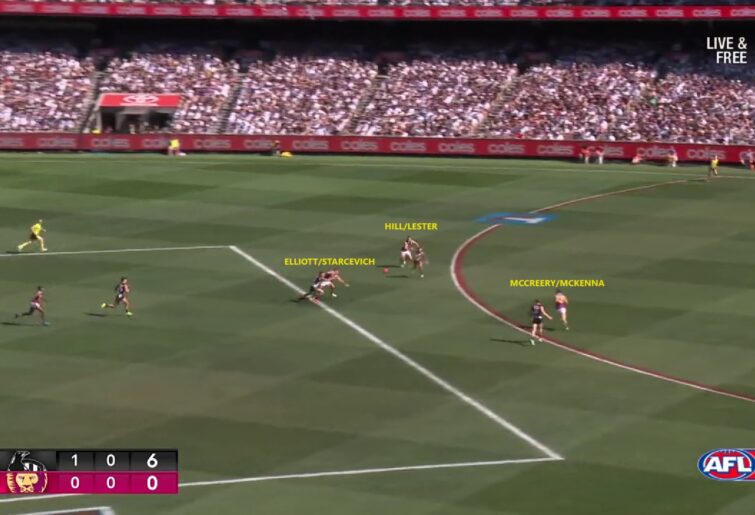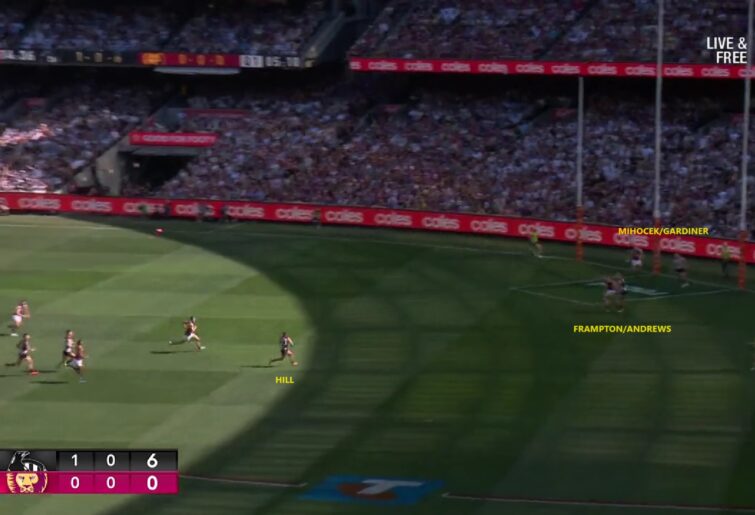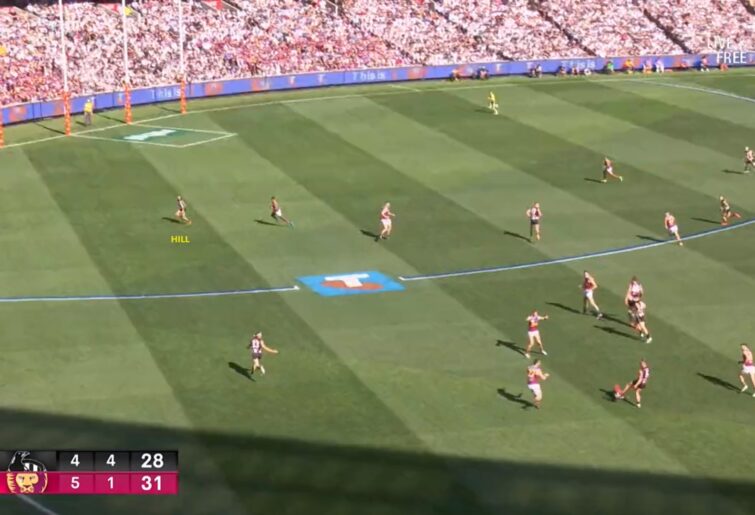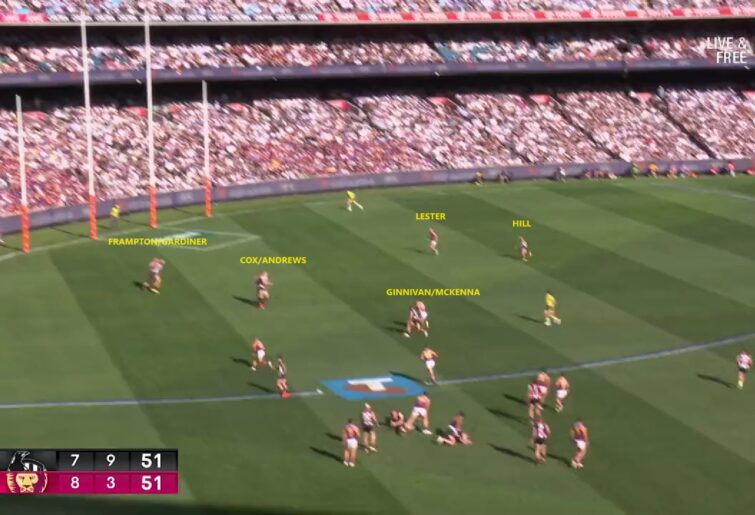In the cold light of day, the full magnitude of what Collingwood achieved on the 30th of September, 2023 will, I hope, be made abundantly clear.
So memorable was the match, so thrilling – and yes, controversial – the finish, so captivating the performances and so widespread the joy as the final siren sounded to send more than 100,000 delirious Magpie fans into ecstasy, that of course it’s going to be all these things that dominate discussion as we all settle down for a pie and a pint to discuss what we were so privileged to witness.
But the truth is that the Pies’ 1958 flag, won over a Melbourne team gunning for its fourth straight and achieved via the sort of no-holds-barred, ruthless means that have symbolised their club for generations, now has company for its greatest ever.
This is a Collingwood team that fears no other. This is a Collingwood team that doesn’t consider, even for a second, that its efforts will end in failure.
This is a Collingwood team that, faced with a red-hot opposition in the Lions with the most formidable attack in the game, having scored 17 goals across two slug-fest lead-in finals with a quarter of them contributed by a key forward in Dan McStay watching on from the sidelines, and with their own key defender lasting just a quarter and a half before being concussed out of the game, decided this was the day for a shootout.
The Magpies looked at a team with all the offensive weapons one could ask for, with a Brownlow Medallist in the guts, two All-Australians in attack, and which at times on Saturday afternoon seemed incapable of missing even the unlikeliest shots at goal, and beat them at their own damn game.
No grand final victory could possibly be more admirable.
Craig McRae warned us during the week that the Pies would be trying something different for the grand final, having rightly judged that Charlie Cameron, Joe Daniher and company would be far harder to thwart than the Melbourne and GWS forward lines his undersized but lionhearted backline had held at bay in the qualifying and preliminary finals.
Up until half time, this manifested in a single-minded desire to take the game on in every possible way, whether it made sense or not.
Hemmed in on the boundary deep in defence with Lions at every turn? Hit a wide-open Oleg Markov in the corridor with a 45 metre bullet, for one.
It wasn’t always successful – Steele Sidebottom handballing maniacally forward from half-back in the first term straight to a Lion one example where desire overwhelmed logic – and it certainly made the Pies more vulnerable going the other way, with Brisbane managing three of their nine first-half goals out the back after forcing turnovers in dangerous positions to expose a Magpies defence pressing up at every chance.
But it meant a side which mustered 60 and 58 points in their two previous finals this September had 63 by half time – and fulfilled McRae’s perpetual promise, to both players and supporters, that being part of this side would be a fun ride. It certainly was.
In the second quarter, the Magpies, normally a heavy kicking-oriented team, had a 49-45 kick/handball split. Regularly looking to play on from marks to overlap runners – Nick Daicos, the wonderful Jack Crisp and Jordan De Goey in particular magnets for handball receives – the Lions were run ragged whenever Collingwood took possession.
In attack, the Pies’ structure was crafty: deepest was nearly always Billy Frampton, who might have had just two disposals but stuck to Harris Andrews like glue and ensured the Lions’ intercept king had to work overtime to have any impact at all on proceedings. But around him, and given space to burn, were the Magpie smalls – and none played a greater role in proceedings than Bobby Hill.
Hill has two things in abundance: speed, and smarts. As pacy as anyone in the game when given room to move and with the forward craft necessary to carve out a home as a goalsneak in an era where that’s just about the toughest role in the game, the way McRae and the Magpies’ brains trust used both those traits should get as much attention as the brilliant bits of individual skill that netted him his Norm Smith Medal.
The Pies had one goal with their forward line set-up: keep the space from 20-40 metres out clear. Set up the talls as deep in attack as possible, have the smalls start essentially on the 50 and push up to the contest, and then look for them to beat their Lions opponents back into that space with pure pace.
The first of Hill’s four goals summed this up to a tee.
The Pies’ three smalls – Hill, Beau McCreery and Jamie Elliott – line up for the centre bounce on the 50, with Elliott going full bore for the middle while the other two hold their ground.

Further back, Frampton is holding his ground in the goalsquare, with Andrews choosing to stay by his side rather than, as I’m sure his instincts must have been screaming out for him to do, taking up a more offensive position in the gaping hole in front of him. Brody Mihocek, meanwhile, drags Darcy Gardiner to the forward pocket, and will proceed to lead laterally back towards the goalsquare rather than out into that space.
The Pies get the ball forward in ungainly fashion, Steele Sidebottom going off the ground, but it’s all they need to get their plan in motion. The kick carries just over Starcevich, with the ball bouncing just well enough for Elliott to cleverly tap over the top to McCreery. He runs, but again laterally into space rather than towards goal, where McKenna is hustling to close the distance down.
He stops, steadies, and his kick to Hill, running right into that 20-40 space range, has beaten Lester running back towards goal. It’s a simple mark, and a simple set shot from there.

There’s nothing 1000-IQ about this tactic; it’s not rocket science. What it is is fully understanding your team’s biggest strengths, the players that feed that, and finding the best possible way to make the best possible use of them.
Hill’s second goal is another great example: when the chain starts with Nick Daicos picking the eyes out of an inboard kick to De Goey 80 from home, Bobby has already begun running back towards goal, with Keidean Coleman caught ball-watching.
De Goey quickly gives to Tom Mitchell, and as this happens Hill’s smarts take centre stage: he knows Mitchell doesn’t have the distance to get the kick long and out the back, so he changes his lead into the pocket, Coleman still lagging behind.
The former Hawk’s kick is exceptional, out in front of Hill and drawing him back to the ball for another simple mark, 40 metres out. Another goal.

Hill’s third goal? Another example of the Magpie smalls charging up the ground and looking to beat their Lions back.
This time, the play is started by Brayden Maynard with another classic Collingwood kick into the middle, finding Jeremy Howe without the veteran needing to break stride.
At the moment he kicks, only one Magpies forward is inside attacking 50 – Frampton, surprise surprise. But there are also no less than three Pies in McCreery, Hill and Jack Ginnivan either goal side of their opponents or near to it, and another in Brody Mihocek charging back towards 50 as well.
Howe goes nowhere near Andrews, instead targeting Hill; the kick is well weighted, but the forward’s stellar leap over Starcevich to clunk a classic grand final speccy was the dose of brilliance that the play needed to be capped off.
Another goal quickly follows.
It’s a play so symbolic of Collingwood under McRae that I should really dub it ‘Fly’s Favourite’. Maynards in other teams would almost certainly go long down the line from that position: Howe, when he marked, had two Lions in Hugh McCluggage and Dayne Zorko closing in, and with the Lions remarkably efficient in attack early a turnover would almost certainly have meant a goal going the other way.
It’s finished off by a moment of individual magic – but that only comes about via a willingness to be creative, to dare, to take the game on and consequences be damned. When you play like that, you’ll be surprised how many of those bits of brilliance also come to pass.
Hill’s fourth was his best: neutralising a one-on-one deep in attack against the much bigger Ryan Lester, before quickly gathering, looking to snap on his right, baulking the Lester smother and goalling on his left.
But it was also borne of the amount of space the Pies had offered him deep in attack: as Patrick Lipinski bombs the footy in his direction, Collingwood, from a stoppage on the edge of their 50, had matched up on every single loose Lion behind the ball, creating a four-on-four, with each holding their own pocket of space.

Elliott and Ginnivan have pushed up to 50 to create space out the back; Ginnivan can be seen running back towards goal stride for stride with McKenna. It’s Mason Cox this time manning Andrews, while Frampton tussles with Gardiner. Hill, meanwhile, has a paddock around he and Lester in the pocket, and it’s this open space that allows him the time and wriggle room he needs to make the magic happen.
There’s a moment or two like this in just about all Collingwood’s nine first half goals: indeed, but for inaccuracy, Hill could have had two more in near-identical circumstances in the second half.
It requires a hell of a buy-in, and a desire to run and run until your lungs wear out, from the smalls, many of whom, Ginnivan and Elliott especially, sacrificed their own dangerous presence near goal to allow it to be Hill’s day.
Poor Starcevich got the flak for a lot of Hill’s goals, but from what I saw he was only directly responsible for one: on a mixmatch of opponents throughout the afternoon, Hill led all on a merry dance, in the process cutting a structurally sound Brisbane back six to ribbons.
Honestly, with six extra scores at half time, the Pies should have been more than six points up; the match ought to have been in their keeping by the time fatigue and heat brought the pace of the game significantly down in the second half.
But here’s where the Pies showed their other core element under McRae alongside their bravery: their tenacity. It was they who, in a tense, no-holds-barred last quarter with everything on the line, had a pressure rating of 204 compared to the Lions’ 149. It was they who once again showed the cool ball use, smart thinking and excellent positioning to regularly take precious time off the clock in those final minutes.
It was they who, when Charlie Cameron gave the Lions the lead with the first goal of the last quarter with only five minutes and 35 seconds left, responded by winning the next centre bounce, forcing it forward, and getting Jordan De Goey on the end of a handball to ram through an instant response and take their advantage back.
Whenever they were challenged in the second half – and it was often – the Pies cranked up the intensity once again, knowing that after a sapping first half short, effective bursts was all they had in them. Elsewhere, they were content to play tempo – they took 26 marks in the third term after 37 combined across the first two – tackle hard, force repeat stoppages and hold the ball in their attacking half for as long as they could.
With 1.6 in the third term, they should again have had the match in their keeping: on another day, 12.18 could well have proved a grand final losing score.
But with respect for Brisbane’s titanic role in proceedings, it would have been a travesty if it had been. So crazy brave was the way the Magpies took to this grand final, so finely tuned was this team to maximise its strengths and do it with a style seemingly manna from heaven for their opponents, that for glory to be snatched from them via the sort of inaccurate kicking that they have mostly avoided under McRae would have been cruel even by Collingwood standards of grand final misery.
But they did it. They did it without Darcy Moore racking up intercept marks by the score. They did it without Scott Pendlebury or Steele Sidebottom needing to wind back the clock with a game for the ages. They did it without any of their talls needing to dominate, as some had suggested was essential to their victory chances.
They did it with heart, soul, spirit, courage, resilience, and a little bloke who used to play for GWS having the day he’ll tell his grandkids about whenever they ask for a bedtime story.
This was already a grand final for the ages. Give it time, and the story of how the Magpies won it will be just as surely etched into Collingwood folklore.
































































































